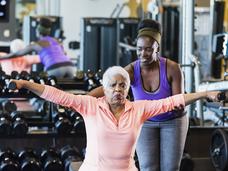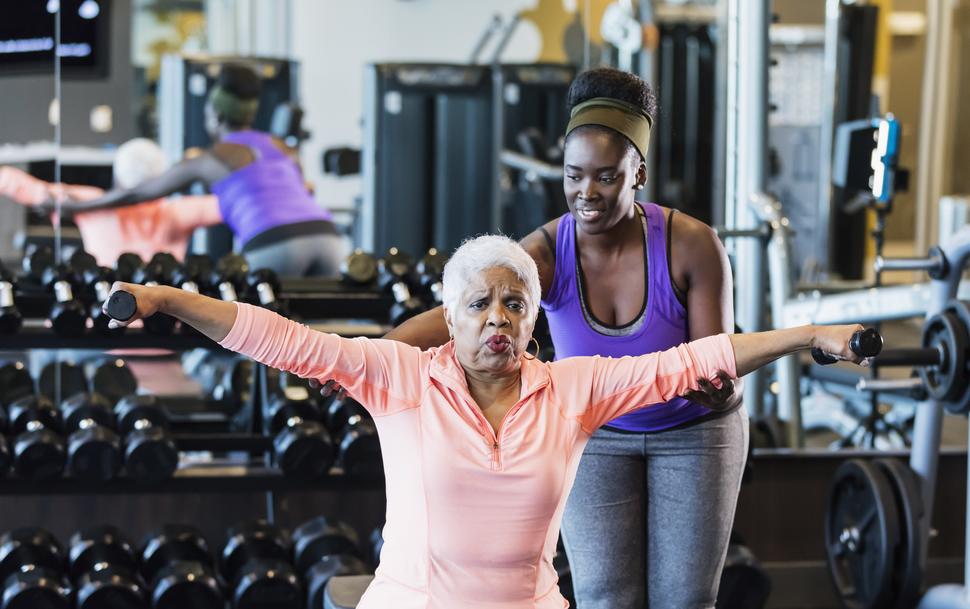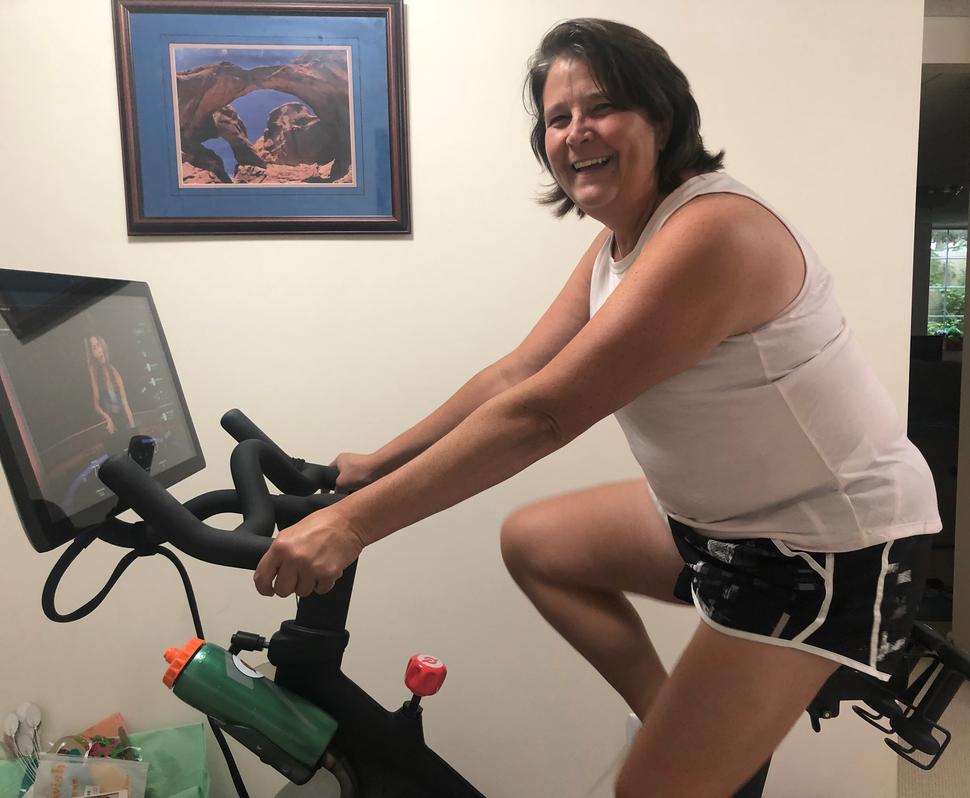, by NCI Staff
In early 2019, after starting chemotherapy for breast cancer, Dawn Schnell began to experience what she describes as a mental fog.
“Within two treatments, I started feeling like I was losing it a little bit,” said Schnell, who was 45 years old at the time. “I’d walk into a room and think, ‘Why did I come in here?’ It really feels like that fog has taken over your brain, and you can’t process as well as you used to.”
Schnell isn’t alone. Up to three-quarters of people with breast cancer report having cognitive impairment during chemotherapy, often called “chemobrain” or “chemofog.” Symptoms can include confusion, memory loss, difficulty concentrating, and a shortened attention span. These problems can last for many years after chemotherapy ends.
Research suggests that physical activity may help people with breast cancer avoid some of these problems. So, while Schnell was undergoing chemotherapy, she took the advice of her health care providers to be more physically active. She would go out for brisk walks, walk on her treadmill, or do laps around her house, even on days when her body ached from the treatments. Schnell said that getting her body moving “was instrumental” in preventing her cognitive problems from getting worse.
Now, a large study of people with breast cancer lends further evidence to the idea that staying active during chemotherapy may help limit the severity of cognitive issues that arise. And the benefits may be even greater for patients who had an active lifestyle before treatment.
In the study, a team led by Michelle C. Janelsins, Ph.D., of the University of Rochester Medical Center, found that people with breast cancer who met the minimum national physical activity guidelines before and during chemotherapy had better cognitive function immediately and 6 months after chemotherapy than people who did not meet the guidelines. The results were published August 18 in the Journal of Clinical Oncology.
These findings “could inform early [symptom] prevention strategies” for people diagnosed with breast cancer, such as prescribing a period of regular exercise before starting treatment, said the study’s first author, Elizabeth Salerno, Ph.D., M.P.H., of the Washington University School of Medicine in St. Louis.
Treatments are extending the lives of people with breast cancer, Dr. Salerno continued, and it’s important to prevent cognitive decline so they can maintain a high quality of life and continue engaging with the world around them.
“This study demonstrates the importance of having a baseline level of physical activity before you start chemotherapy,” said Diane St Germain, R.N., M.S., C.R.N.P., of the Community Oncology and Prevention Trials Research Group in NCI’s Division of Cancer Prevention. “What’s important as next steps is really understanding the timing and the dosing of exercise and what’s feasible within the context of getting chemotherapy.”
Searching for the Culprits
Researchers are still trying to understand the causes of cancer-related cognitive problems.
“There’s evidence suggesting that having cancer itself may be associated with poorer neurocognitive functioning,” said Catherine M. Bender, Ph.D., R.N., of the University of Pittsburgh. Dr. Bender is part of a team conducting an NCI-funded clinical trial looking at the biological mechanisms of how exercise affects cognitive function in people with breast cancer.
In past studies, she and her colleagues have found that some people with breast cancer experience worsening cognitive function even before therapy begins. “That suggests that it may be some characteristics of the disease that’s contributing to the problem,” Dr. Bender said. The distress caused by learning of a cancer diagnosis may also have a part to play, she continued.
“And then, of course, there’s a good deal of evidence suggesting that systemic therapy like chemotherapy, immunotherapy, and hormonal therapies are associated with declines in neurocognitive function.”
Genetics may also play a role. Studies have shown that a particular version of a gene that has been linked to Alzheimer’s disease may also be a risk factor for cancer-related cognitive problems.
No medications are approved to treat the condition. However, some doctors prescribe drugs such as the stimulant Ritalin to ease symptoms. Other interventions include cognitive exercises, coping strategies, and stress relief.
Physical activity has been shown to improve cognitive function in healthy older adults, and some studies have suggested that physical activity similarly benefits people with breast cancer undergoing chemotherapy. Although people who engage in physical activity after completing chemotherapy treatment have reported improved cognitive function in some studies, few have looked at the impact of physical activity before and during treatment.
Making the Physical Activity Connection
In the observational study led by Dr. Janelsins, researchers compared the level of physical activity that patients with breast cancer maintained before, immediately after, and 6 months after chemotherapy with that of age-matched people without cancer at equivalent time points. The study included 580 people with breast cancer and 363 people without cancer.
The study participants were recruited from 22 community oncology sites across the United States that are part of the NCI Community Oncology Research Program (NCORP).
“By doing the study in these kinds of … geographically different, racially diverse, economically different individuals, our results are far more generalizable,” said study coauthor Karen M. Mustian, Ph.D., M.P.H., of the University of Rochester Medical Center.
Study participants completed detailed questionnaires about the level and frequency with which they engaged in various activities, from household chores to vigorous sports, three times during the study: within 7 days of their first chemotherapy treatment, within a month of their last chemotherapy treatment, and 6 months after their final chemotherapy treatment. Patients also answered questions about their cognitive functioning at the various time points and took cognitive tests.
About one-third of patients were meeting national physical activity guidelines before chemotherapy. That number dropped to 21% during chemotherapy but rose to 37% after chemotherapy.
“Despite this recovery, almost two-thirds of patients remained insufficiently active,” Dr. Salerno noted.
Patients who were more active before starting chemotherapy performed better on cognitive tests immediately and 6 months after completing chemotherapy than patients who were less active before starting chemotherapy, the researchers reported.
Patients who continued to meet physical activity guidelines (of 150 minutes of moderate-to-vigorous physical activity per week) before and after chemotherapy had the best cognitive performance across the treatment period. Patients who never met the physical activity guidelines reported worse cognitive performance before and after chemotherapy.
Dr. Janelsins said randomized trials with physical activity interventions prior to and during chemotherapy are needed to confirm their findings on the impact of exercise on cognitive functioning. She added that those studies should also look at the amount, or “dose,” and types of activity that are most effective at minimizing cognitive issues.
St Germain pointed out that despite the geographic diversity of the participants in the current study, most were White and postmenopausal. Future trials, she said, need to include people from more diverse backgrounds to ensure that any exercise interventions—that is, structured physical activity—tested are applicable and accessible to as many people as possible.
Beyond Cognitive Function
Physical activity can have benefits beyond improving cognitive function.
“Being physically active can actually help reduce fatigue, help with anxiety and depression, and it can improve physical function,” said Dr. Salerno. Studies have found that women with breast cancer who engage in regular physical activity before their cancer diagnosis and after treatment are less likely to have their cancer come back or to die than those who are inactive. Physical activity is also associated with a lower risk of 13 types of cancer.
When it comes to cognitive function, some researchers are looking at whether the type of physical activity is important. Those studies will provide critical information moving forward, said Diane Ehlers, Ph.D., of the University of Nebraska Medical Center.
“How can we use what we learn to provide other ways of helping people get active that doesn’t introduce too much extra burden?” asked Dr. Ehlers, who is conducting an NCI-funded clinical trial testing aerobic exercise training on enhancing cognitive function in breast cancer survivors. “Because, then, on those days when you are really fatigued or … nauseous, you can try to move at different points in the day. That’s going to be much more palatable.”
“While we don’t know how much activity is needed to improve cognitive functioning, doing something active is better than doing nothing,” said Sheri J. Hartman, Ph.D., of the University of California San Diego, who is conducting an NCI-funded clinical trial studying the effect of physical activity on cognitive functioning in breast cancer survivors. “It’s figuring out how to move more every day, even if you can’t hit those guideline recommendations,” she said.
Dr. Janelsins said that people with cancer who are considering starting an exercise program should consult with their health care providers. “Their medical team can help them identify the activities that are going to be most appropriate for them,” she said. But most patients could benefit from simply moving more throughout their day, she added.
Now cancer free, Schnell continues to maintain an active lifestyle. She stays motivated by reminding herself that she’s investing in her future. “I don’t want the cancer to come back,” said Schnell, who participated in one of Dr. Janelsins’s studies. “I need to continue building on a healthy lifestyle so that I don’t have to go through this again.”









